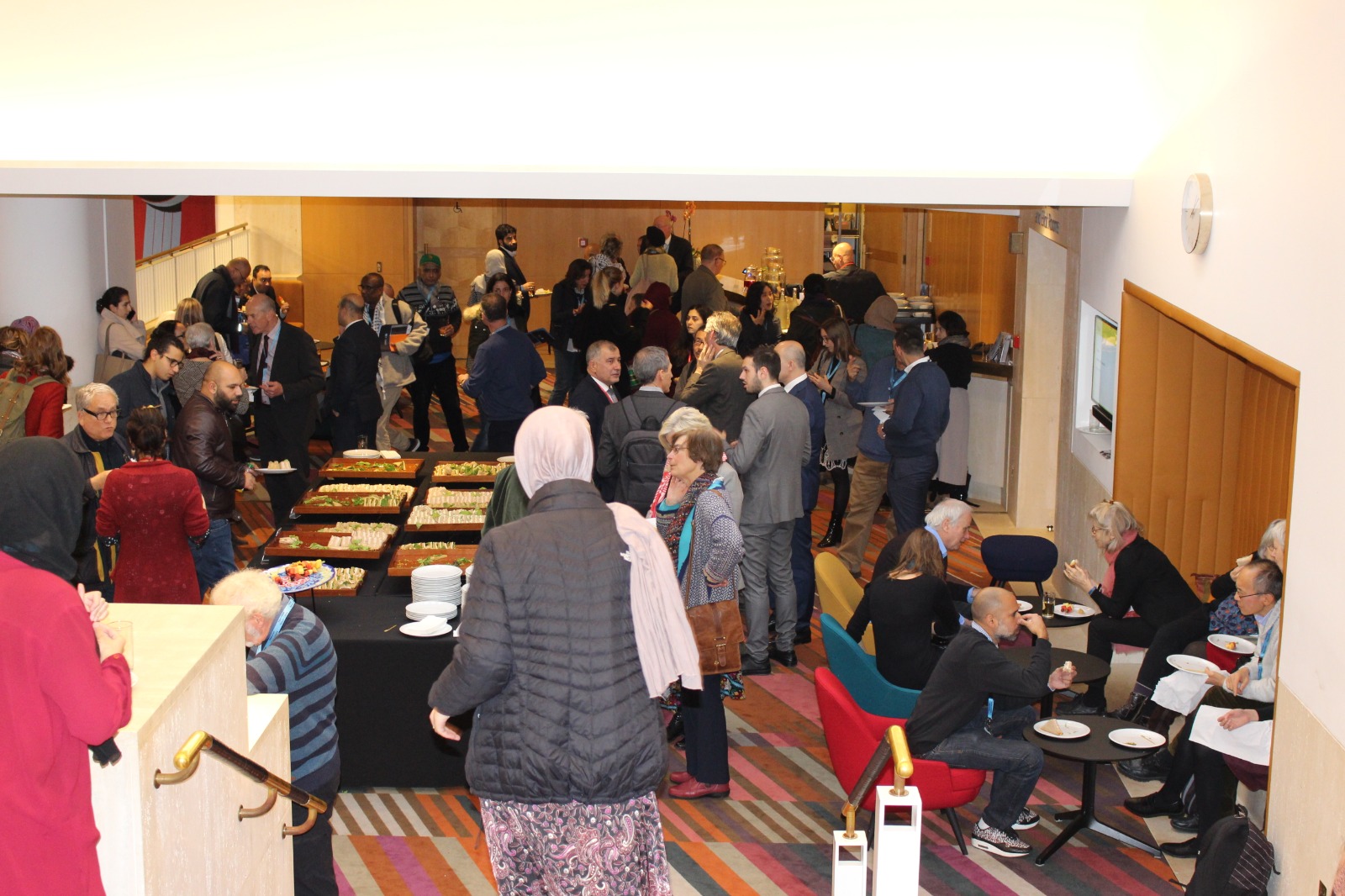PRC Concludes Successful Conference on UNRWA

The Palestinian Return Centre (PRC) wrapped up on Saturday a one-day conference about the United Nations Relief and Works Agency for Palestine Refugees in the Near East (UNRWA), to which a plethora of renowned scholars and human rights experts actively contributed.
Titled “UNRWA at 70: Responding to Crises and Building a Just Future”, the conference was held by PRC, in partnership with AlJazzeera Center for Studies and the European Center for Palestine Studies at the University of Exeter. It took place on Saturday, November 30, at a British Library venue.
The opening address was delivered by PRC’s Director-General Tareq Hammoud who expressed his honor to address the audience as a refugee who had grown up at relief facilities run by UNRWA.
As he harked back to his childhood days, Hammoud expressed his honor to address the audience as “a refugee who knows how it feels like to grow up in refugee camps, torn away from the nourishment of home and warmth of family”.
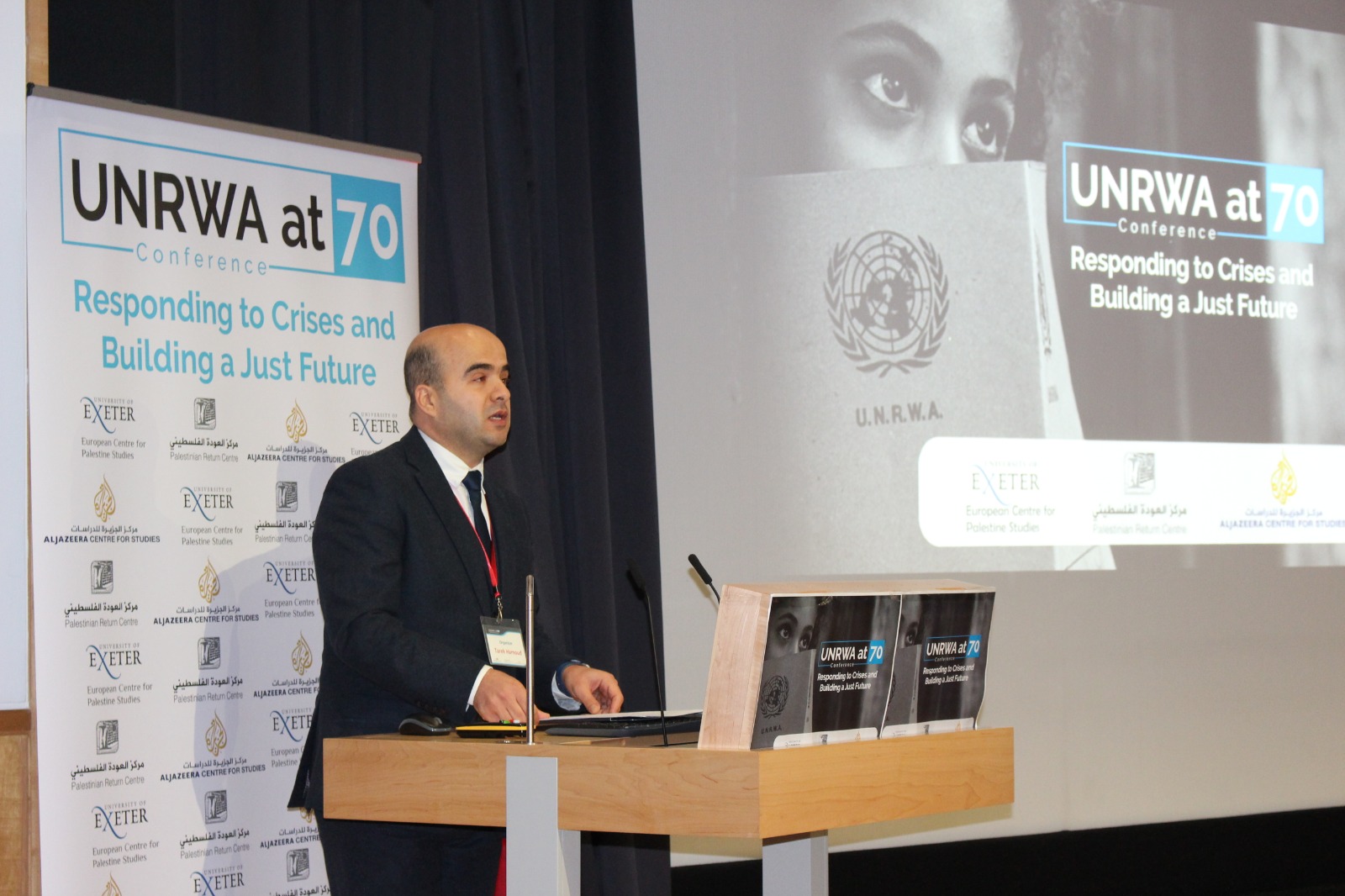
“UNRWA is a stark reminder of my childhood memories. My body stills carry the traces of a vaccination shot injected by an UNRWA nurse”, he said.
Hammoud underscored the importance of UNRWA as an institution that has shaped Palestinians’ awareness of their refugee status, saying the Agency “will forever remain an international witness of the sufferings of Palestinian refugees, of the nature of our identity, and of our refugee status which will only change when our right of return materializes on the ground”.
PRC’s Director-General hailed the 170 Member States who voted this month in favor of a resolution to renew the Agency’s term of office for another three years, despite the ad hominem campaigns waged by the US and Israel to rescind the agency’s mandate.
“This vote is an unequivocal rejection of a ferocious campaign to wipe out UNRWA’s presence and revoke the inalienable rights of Palestine refugees, most notably the right of return”, he stated.
Hammoud drew attention to the internationally-recognized nature of the Right of Return, which achieved customary status in 1948 when the UN General Assembly passed Resolution 194(III) affirming the rights of Palestinian refugees to return to their homes and to obtain restitution and compensation.
He announced PRC’s intent to launch an international campaign to garner signatures from Palestinian refugees expressing firm rejection of all attempts to negate Palestinians’ inalienable right of return.
“With over 7 million refugees scattered across the globe, the international community should step up efforts to preserve vital services by UNRWA”, Hammoud’s inaugurating speech read. “Until Palestinians’ dream to return to their homeland comes true, Palestine refugees will continue to face substantial challenges to the full enjoyment of their rights.”
As part of the inaugurating session the conference, renowned academic Arafat Madi, from AlJazeera Center for Studies, underscored the dangerous challenges faced by UNRWA and Palestine refugees.
Madi said that the Palestinians issue is still within the most important issues in the Middle East, in light of the US President Donald Trump’s pro-Israel policy and biased positions regarding the conflict.
AlJazeera representative said that recent US decisions concerning UNRWA, Jerusalem, the Golan Heights and most recently Israeli settlements are a reflection of its monolithic and unilateral standpoint regarding the Palestinian issue.

He added that after 70 years since UNRWA was mandated by the UN to assist Palestine refugees the crisis has not been solved and the future and rights of refugees remain endangered.
“UNRWA is facing more and more challenges from Israel and lately from the United States to curtail its work or dismantle it all together”, warned Madi.
The scholar underlined the importance of this conference, which he said is a great opportunity to have a new look at UNRWA’s work after 70 years, to shed light on the challenges it faces, the pitfalls it had, the resources it needs, and the role UNRWA can play to secure a better future for Palestinian refugees.

Speaking at the first session of the conference, former UNRWA Commissioner-General Karen Abu Zayd, who had been involved in the refugee issue since 1981 with UNHCR, talked about her 10 years in the Gaza enclave, where she had lived with Gazans and the Palestine refugees from 2000 to 2010.
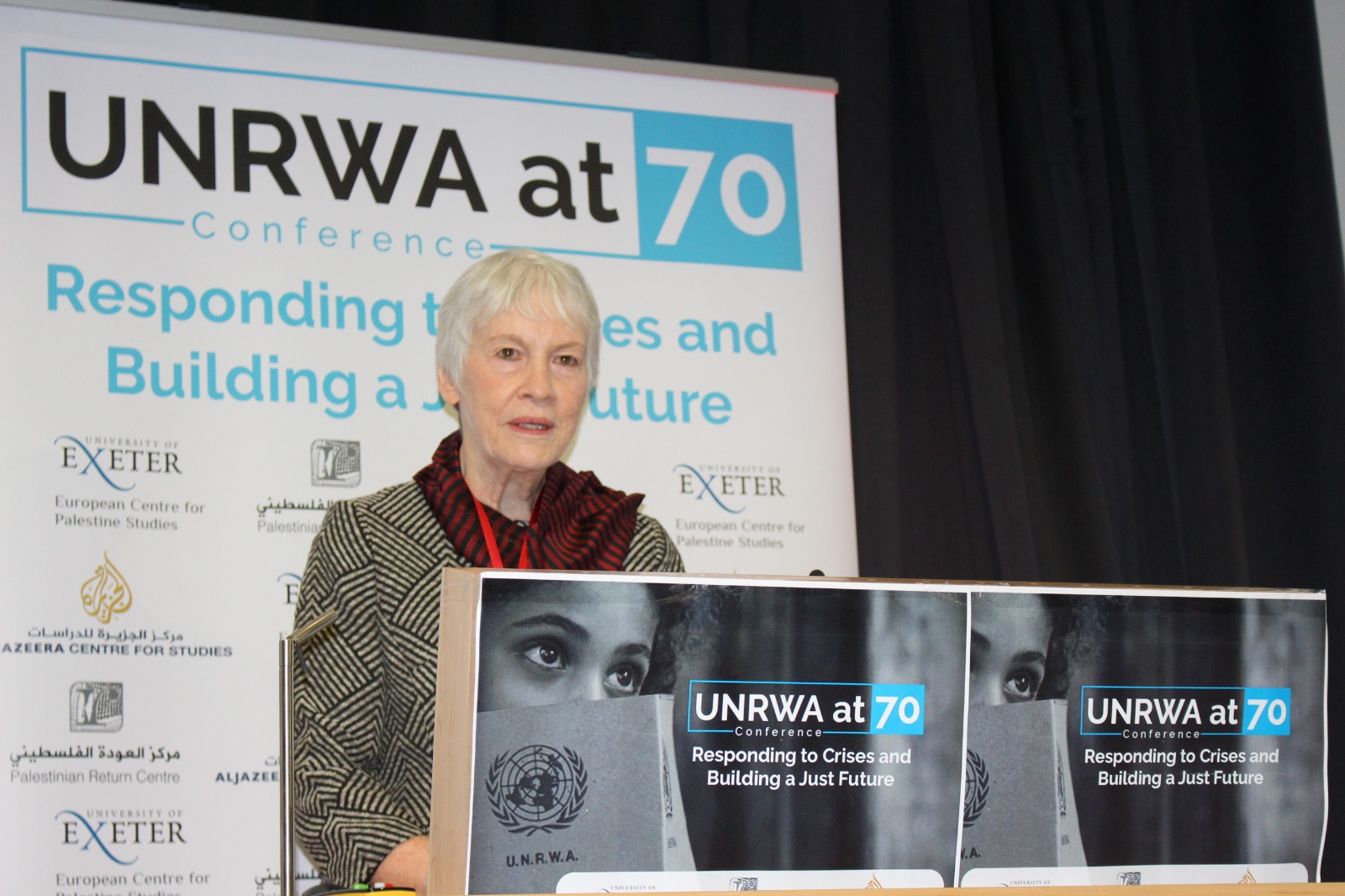
She described the hardships of life under the Israeli occupation and siege, saying Gazans’ stories and lives have been ones of increasing hardships and threats with all the restrictions the occupation imposes and the repeated, sometimes deadly, attacks Israel engages in without restraint.
Abu Zayd highlighted the overall lack of freedoms in the blockaded Gaza Strip, including the right to move beyond the Israeli-controlled borders, resulting in “the impossibility to enjoy or even live what can be termed elsewhere as normal life”.
“I recall my decades in Gaza with pleasure, sadness and anger”, said Abu Zayd who had served as UNRWA’s deputy Commissioner-General from 2000 to 2005, before she was appointed in 2005 as the Agency’s Commissioner-General.
“What I wish to convey is the disconcerting environment which in many ways and times during the decade I’m describing appeared to be blatantly contradictory”, said the former UN official as she described the “hostile occupier” gripping the Palestinian territories.
“One needs only to take note of the ever-increasing encroachment on Palestinian homes, historical and religious sites, and their lands, which occurred on a regular basis”, stated Abu Zayd.
Speaking next was UNRWA's Director of Legal Affairs Rachel Evers, who opened her address by reminding the audience of the Agency’s mandate green-lighted by the UN some 70 years ago to meet the needs of Palestine refugees pending a just and durable solution to their plight.
Evers said UNRWA’s continuing existence represents the ongoing needs Palestine refugees have as a result of the lack of a political solution to their plight.
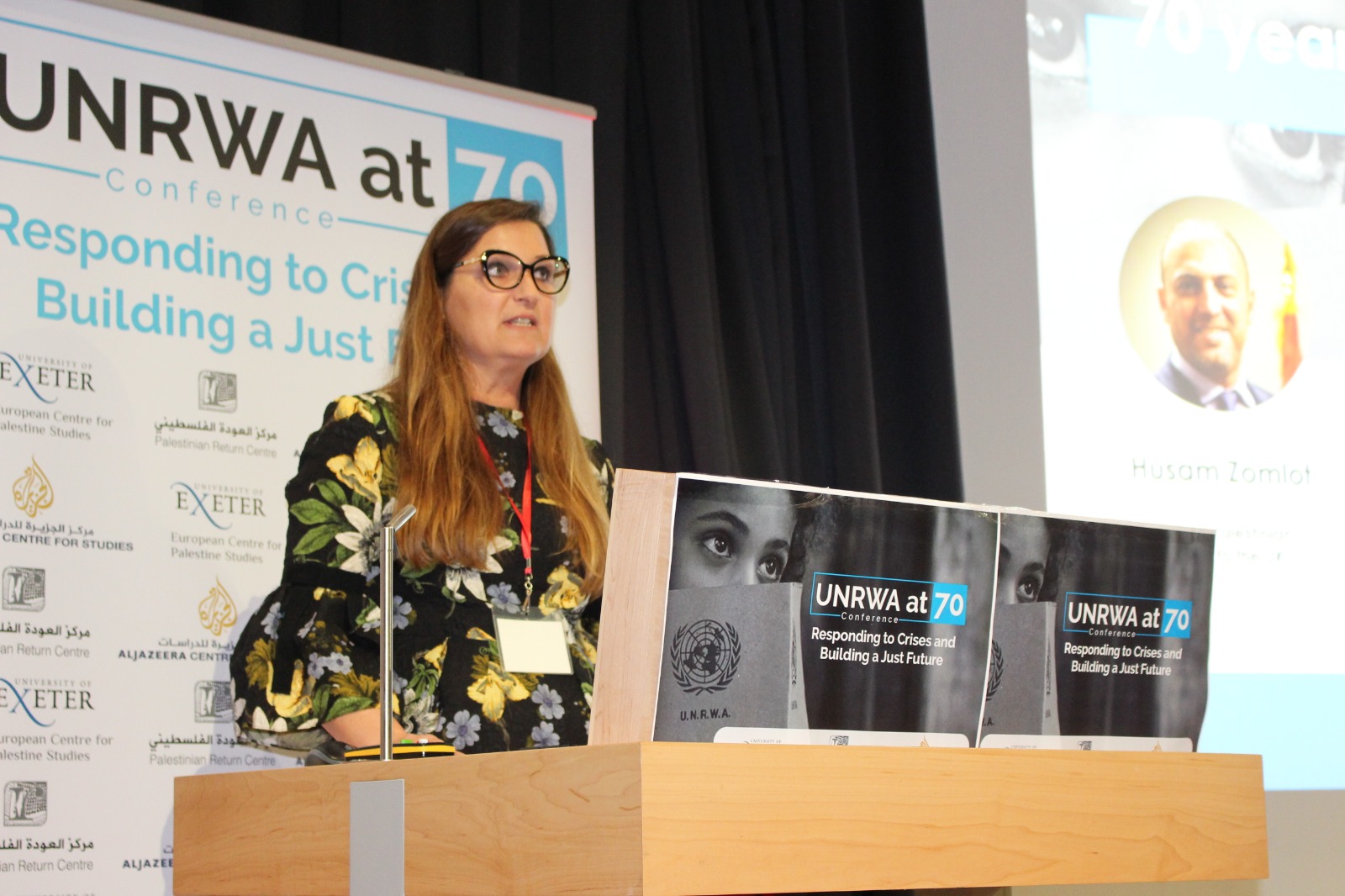
She said claims that UNRWA prolongs the refugee problem is inaccurate as the agency exists as a function of the lack of a political solution and the continuing needs of Palestine refugees as determined by the General Assembly.
“Palestine refugees remain refugees for as long as their situation is not resolved”, stated Evers. “Today more than 5 million Palestine refugees are eligible for UNRWA services in the key areas of its operations”.
UNRWA’s legal chief provided updated statistics on the Agency’s services and beneficiaries. She said that UNRWA offers preventive and curative health services to nearly 3.1 million refugees through more than 140 health clinics
“Of the some 5 million Palestine refugees, it’s estimated that 1.2 million live in absolute poverty, 700,000 of them live in abject poverty, unable to meet even the most basic of needs”, she added.
Pointing out “the international community’s collective failure to achieve a negotiated solution to the conflict and to ensure and enforce respect for international law across the region”, the UN official said thousands of Palestine refugees remain displaced, away from their land and families, still holding the keys to their homes from which they have been forced out by the Israeli occupier.
She wrapped up her speech by highlighting the financial uncertainty witnessed by UNRWA and the successive crises that have plagued the agency over the last decade, following the defunding of its biggest donor, the United States.
“We’re a living reminder of what happens when no political solutions are found to address the underlying causes of historic injustice. At the heart of indignity and the plight of Palestine refugees, is an unresolved conflict, an ongoing occupation, and a lasting injustice”, stated the UNRWA’s legal chief.
As part of his contribution via video conferencing, Michael Lynk, the UN Special Rapporteur for the situation of human rights in the Palestinian Territory occupied since 1967, discussed five main issues in the context of international law, the occupation, and the human rights of Palestinian refugees.
He stressed UNRWA’s role in maintaining the right of return as “a solid individual right” which gains further currency in the context of Israel’s refusal to allow refugees to return home.
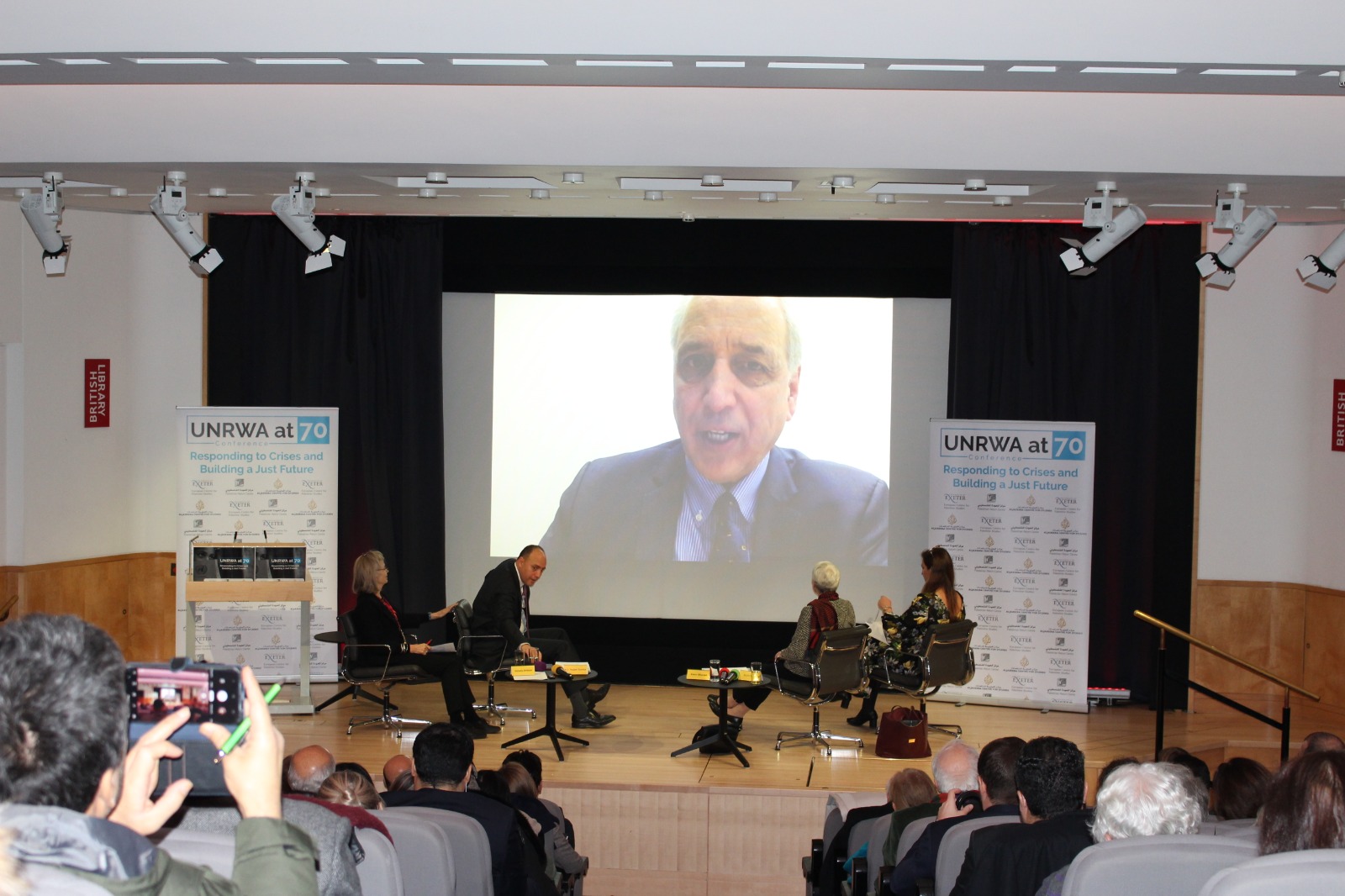
The UN Special Rapporteur said UNRWA remains the main guarantor of the survival of Palestinian refugees and the main symbol of the international community’s commitment towards them.
Lynk called for a just and durable solution to the Palestine refugee problem which addressed outstanding issues in the framework of human rights and of international law.
He criticized the view that resolving UNRWA would be a positive step, saying: “In my mind nothing can be further from the political truth or the legal obligation”.
“Rather the obligation rests with Israel and with the international community to implement just and durable solutions with this population”, stated Lynk, adding that solutions must be consistent with humanitarian/human rights obligations and also must take into consideration the right of return to those who wish to exercise it.
The second session of the conference tackled the relationship between UNRWA and Palestinian refugees.
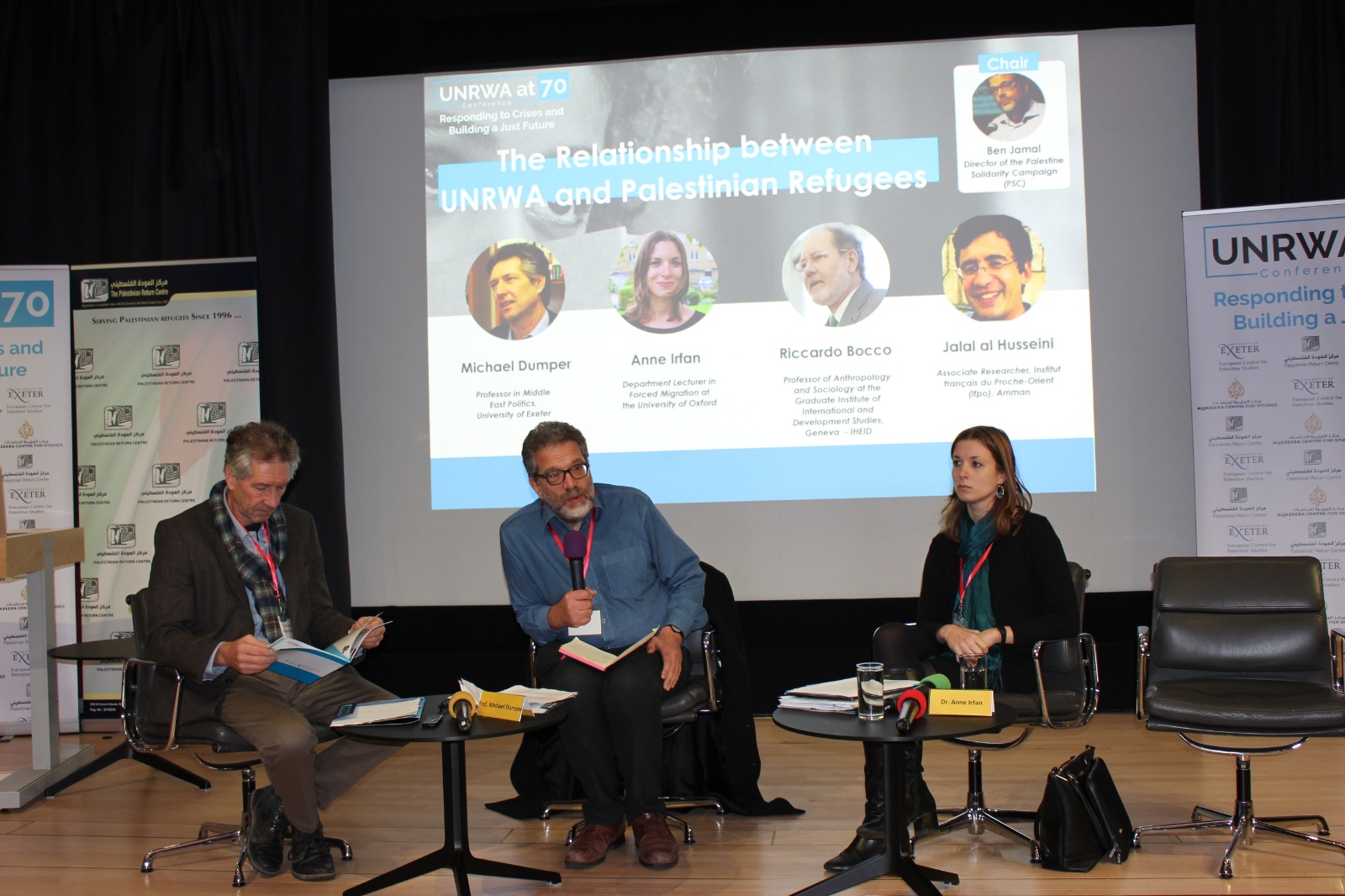
Department lecturer in forced migration at the University of Oxford, Anne Irfan, delivered a presentation entitled “Whose Agency: UNRWA and Palestinian Refugees in History”.
Dr. Irfan said UNRWA’s work is not seen as charity by the Palestinians but as a right. Therefore, cutting UNRWA services amounts to an infringement of Palestinian rights.
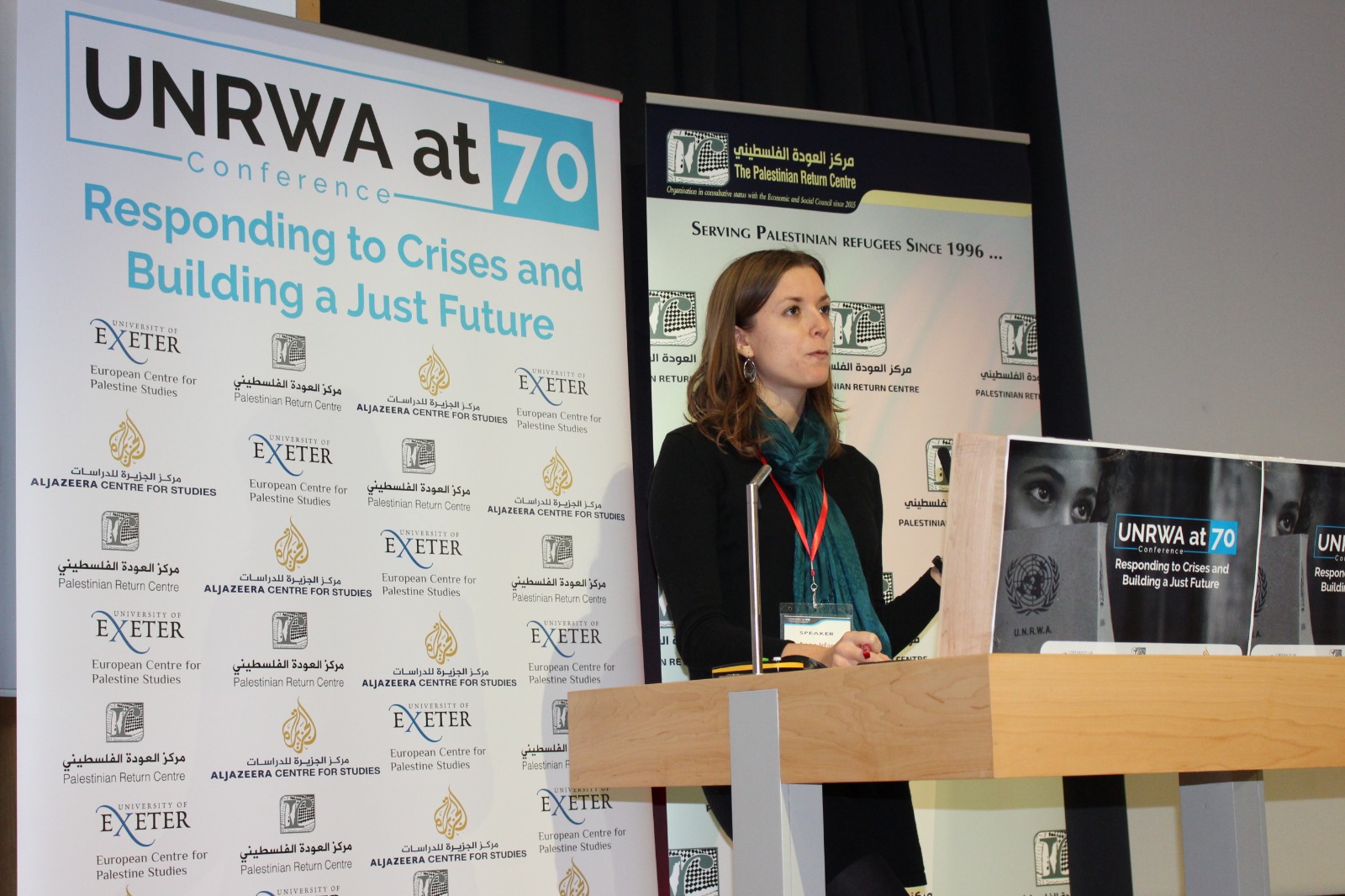
Professor in Middle East Politics at the University of Exeter, Michael Dumper, outlined some possible scenarios impacting the future of UNRWA, 70 years on.
He said that it is really hard to envisage UNRWA existing with the same mandate in 20 years and stressed the need to boost support for the agency in order to help it maintain its services in the future.
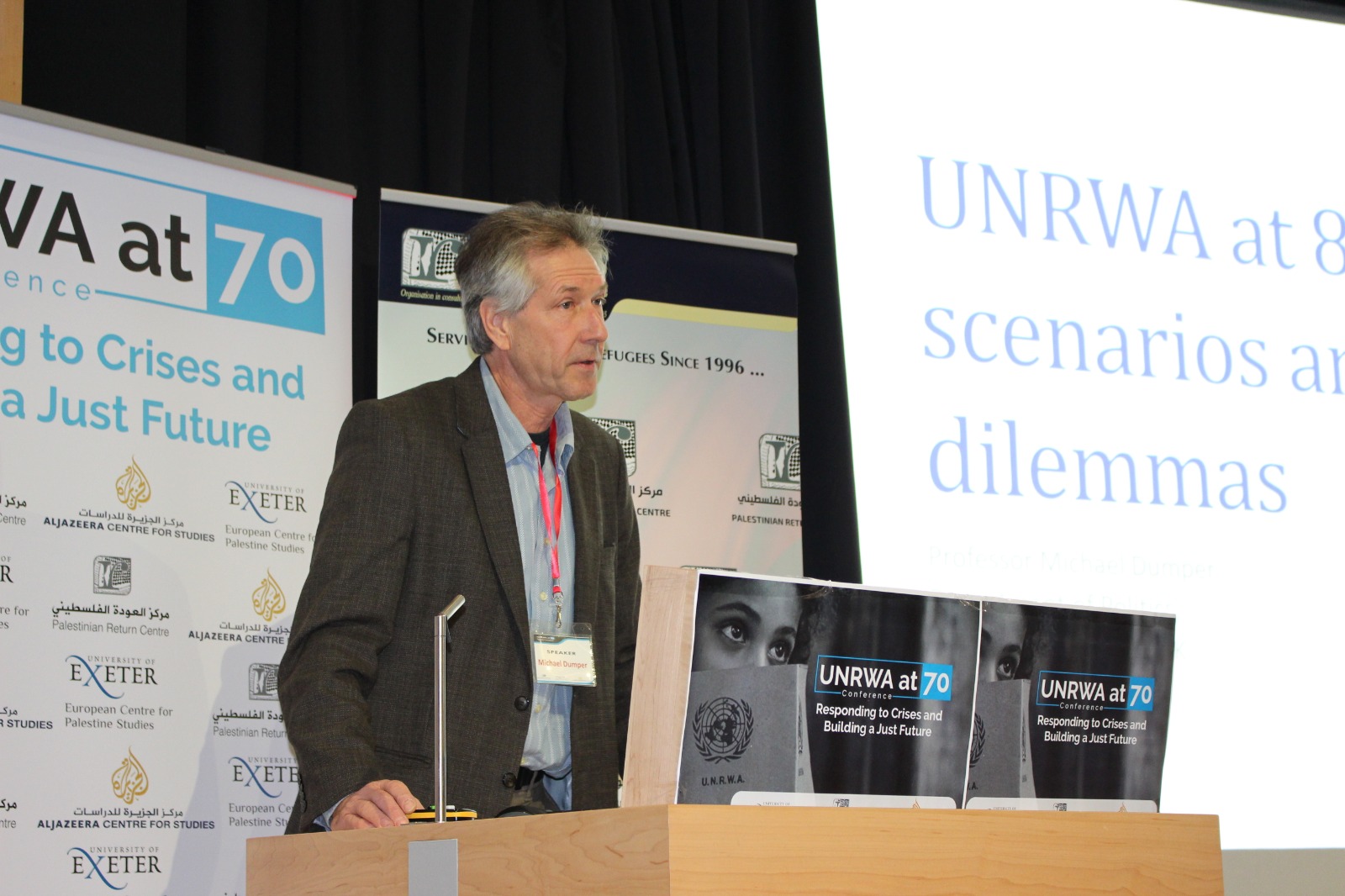
Entitled “the Unmaking of Palestinian Refugee Camps” and chaired by Karen AbuZayd, the third session was devoted to discussions about the situation in refugee camps and communities across and outside UNRWA’s fields of operations.
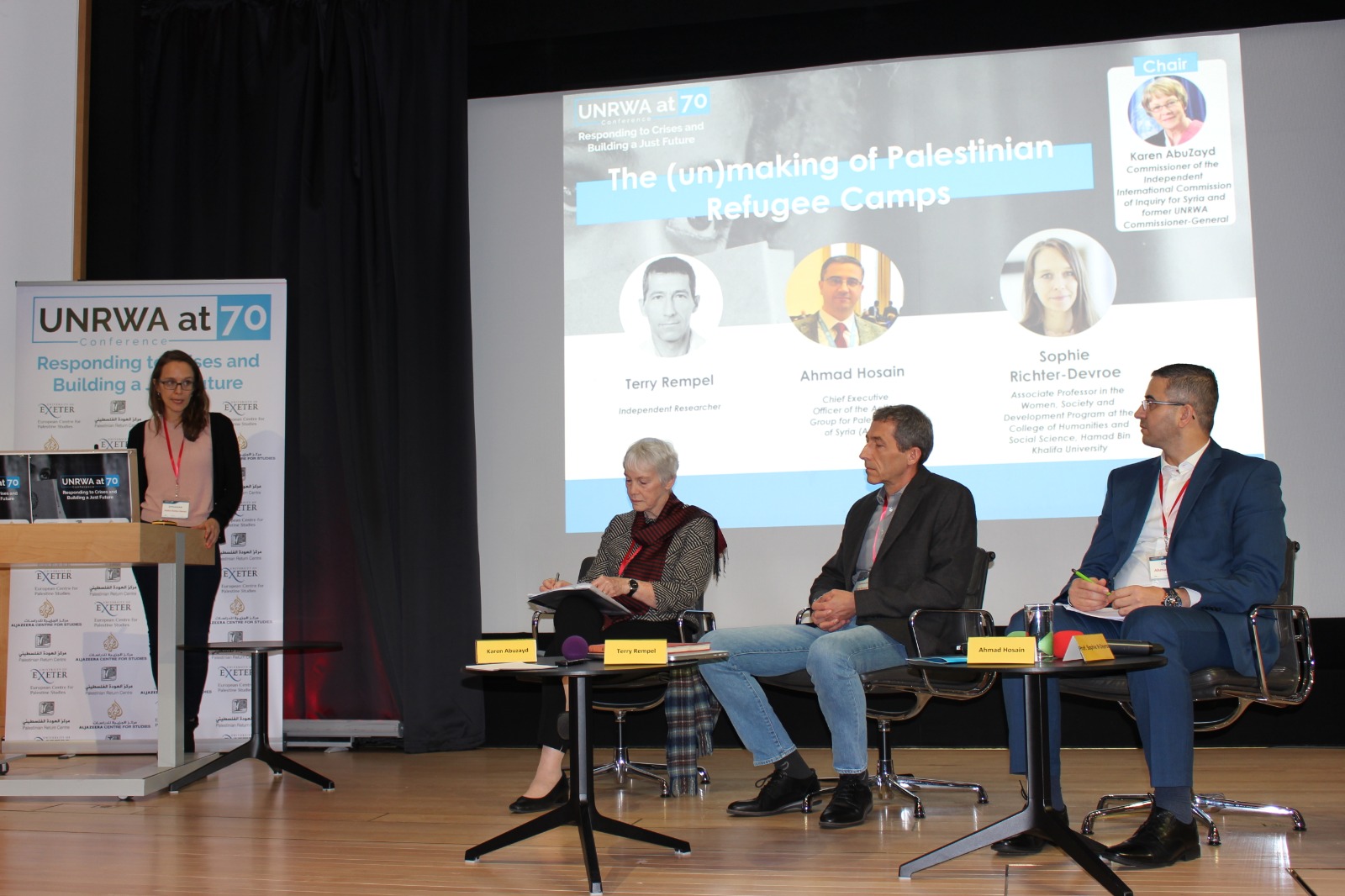
Associate Professor in the Women, Society and Development Program at the College of Humanities and Social Science at Hamad Bin Khalifa University, Sophie Richter-Devroe, delivered a presentation on how young Palestinian refugees challenge the notion of state and homeland according to their own perception as refugees.
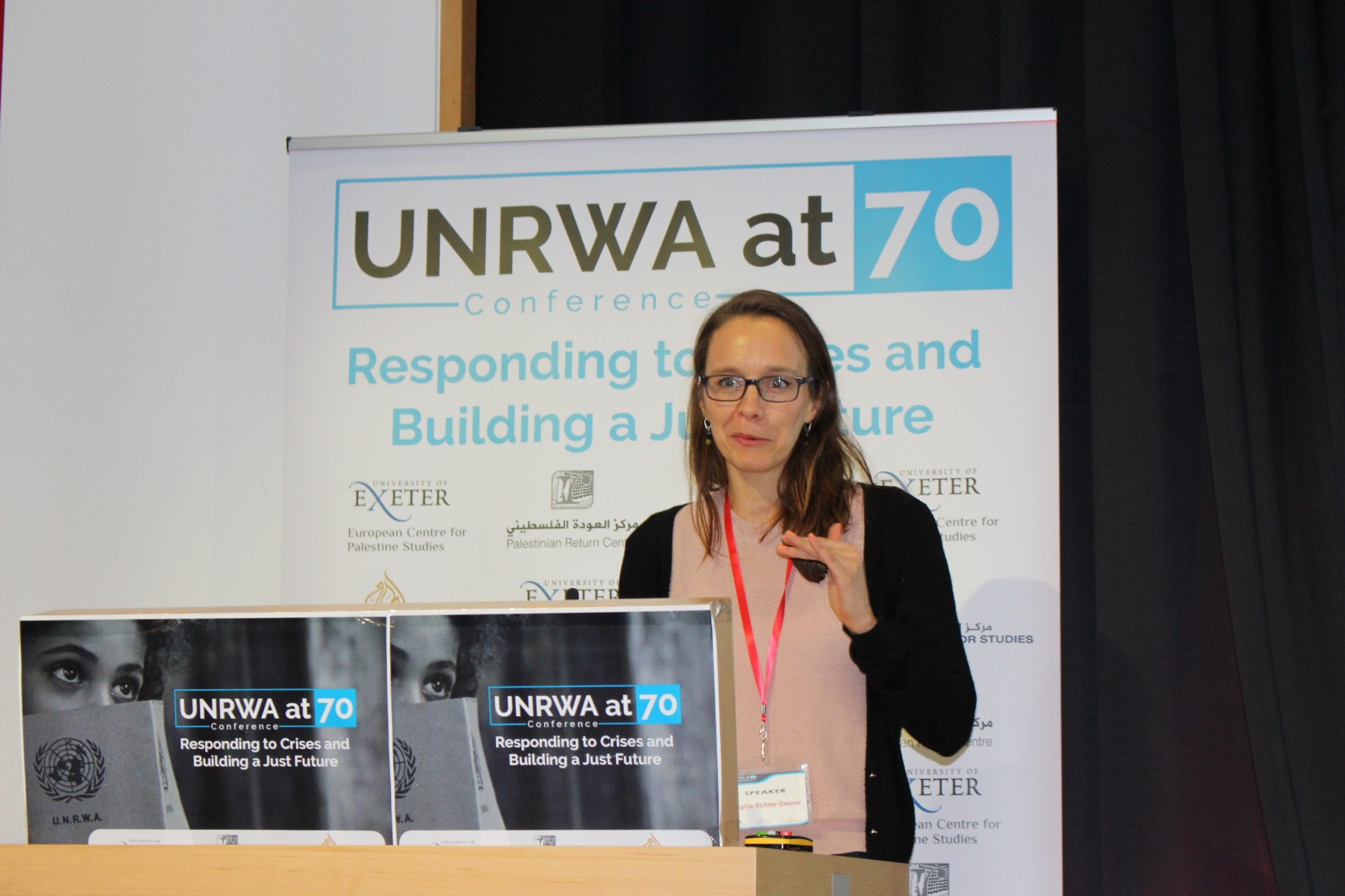
She said that in the minds of young Palestinian refugees, the camps are seen as spaces to be attached to, as their home, not as a place to be erased once the occupation ends.
Independent researcher Terry Rempel tackled the policies of elimination and displacement against Palestinians implemented by the Israeli occupation to deny Palestinians’ the right to return to homes and places of origin.
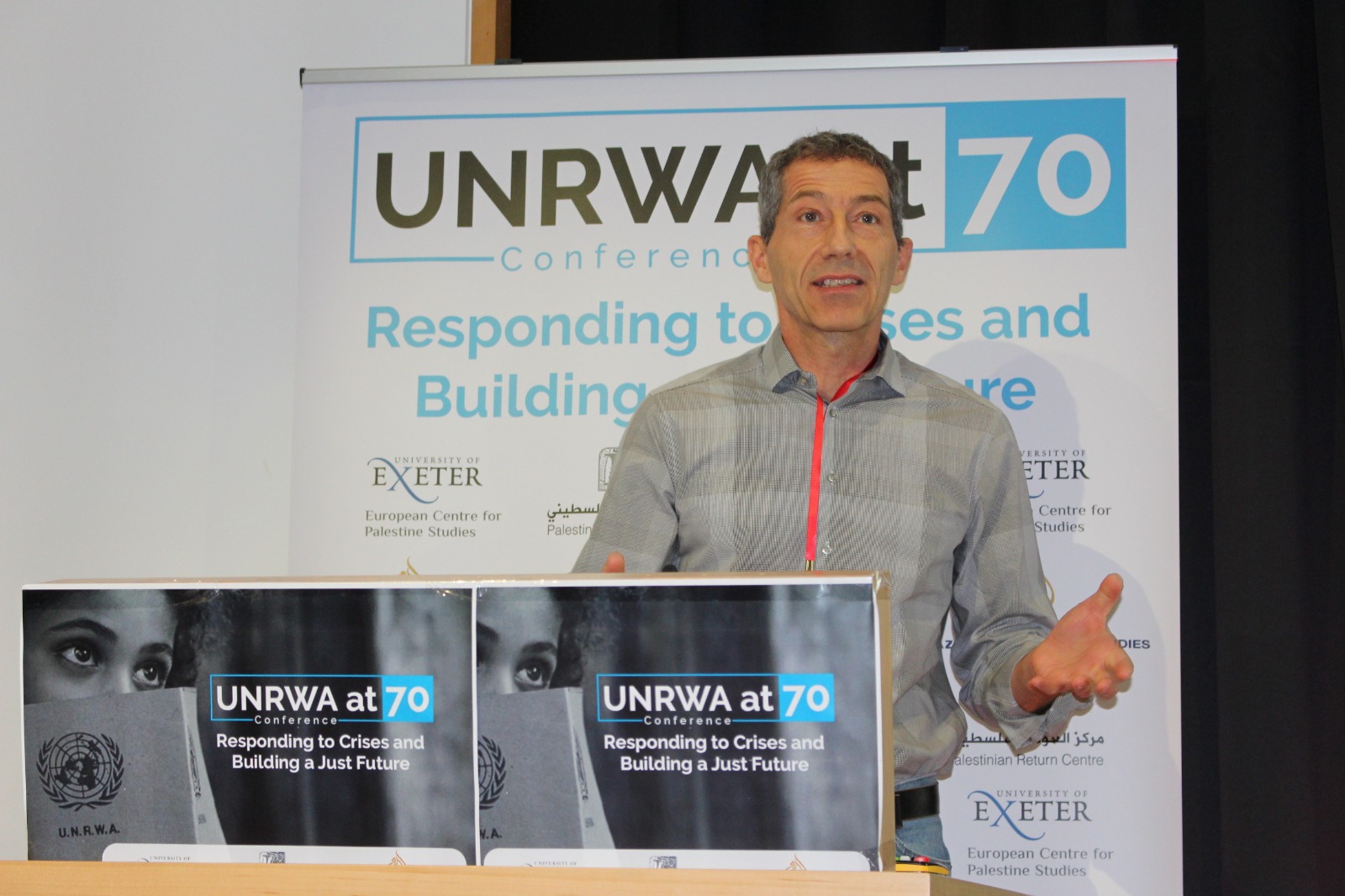
Rempel said the 1960 stamp stands as a metaphor for the situation of Palestine refugees throughout history.
Ahmad Hosain, Chief Executive Officer of the Action Group for Palestinians of Syria, discussed the situation in Palestinian refugee camps and communities in war-torn Syria and the pace of UNRWA’s operations both before and after the conflict.
Mr. Hosain also provided updated statistics about the number of victims and the serious human rights violations committed against the Palestine refugee community across the Syrian territories.
He further gave a set of recommendations, including the need for UNRWA to expand its geographical map to include registered Palestine refugees in Turkey, Egypt, and other destinations.
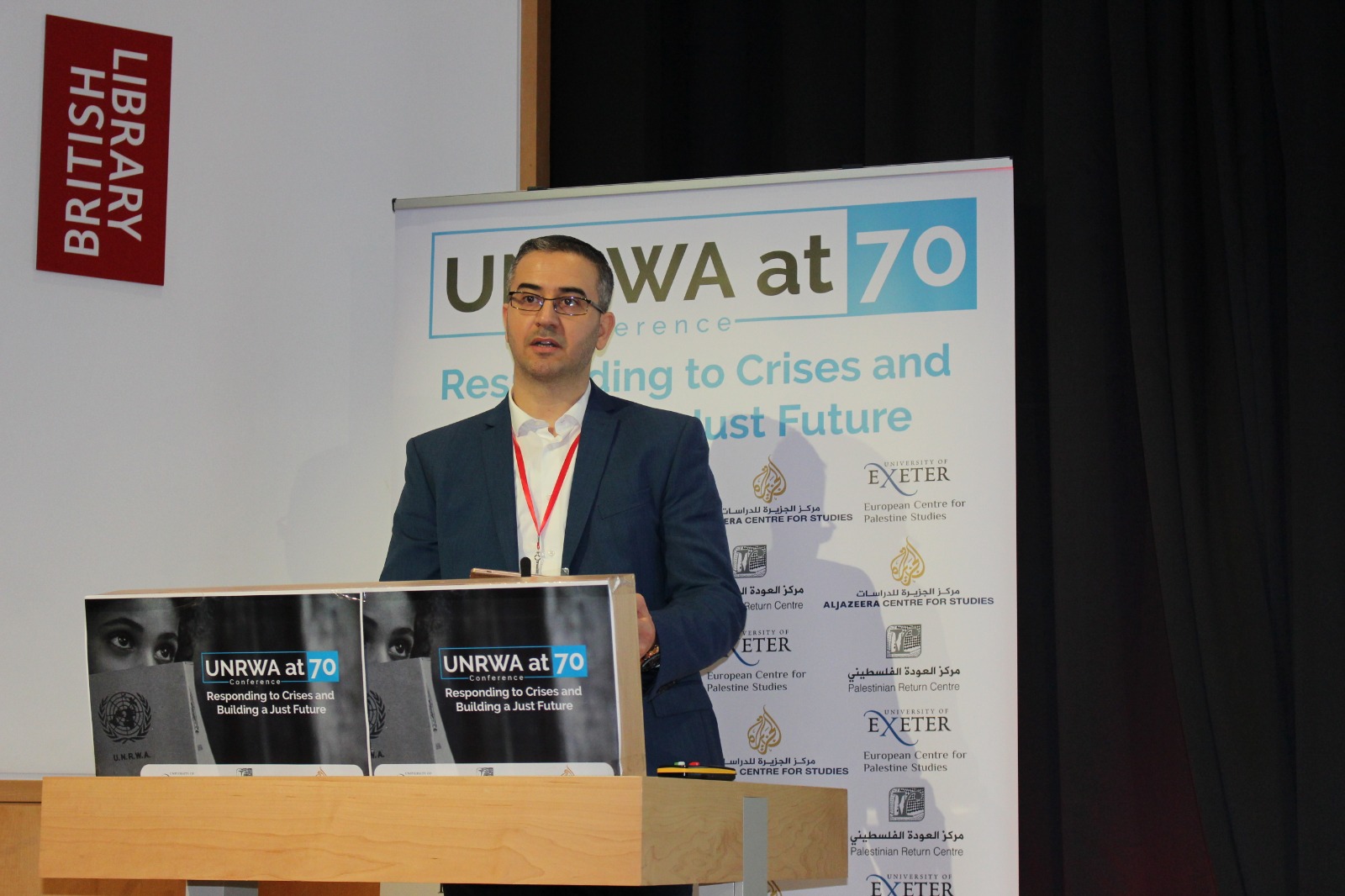
AGPS’ Executive Director also stressed UNRWA’s key role in providing life-saving services for the displaced Palestinian community in and outside Syria and called on the agency to adopt practical mechanisms in order to secure the refugees’ physical, moral, and legal protection.
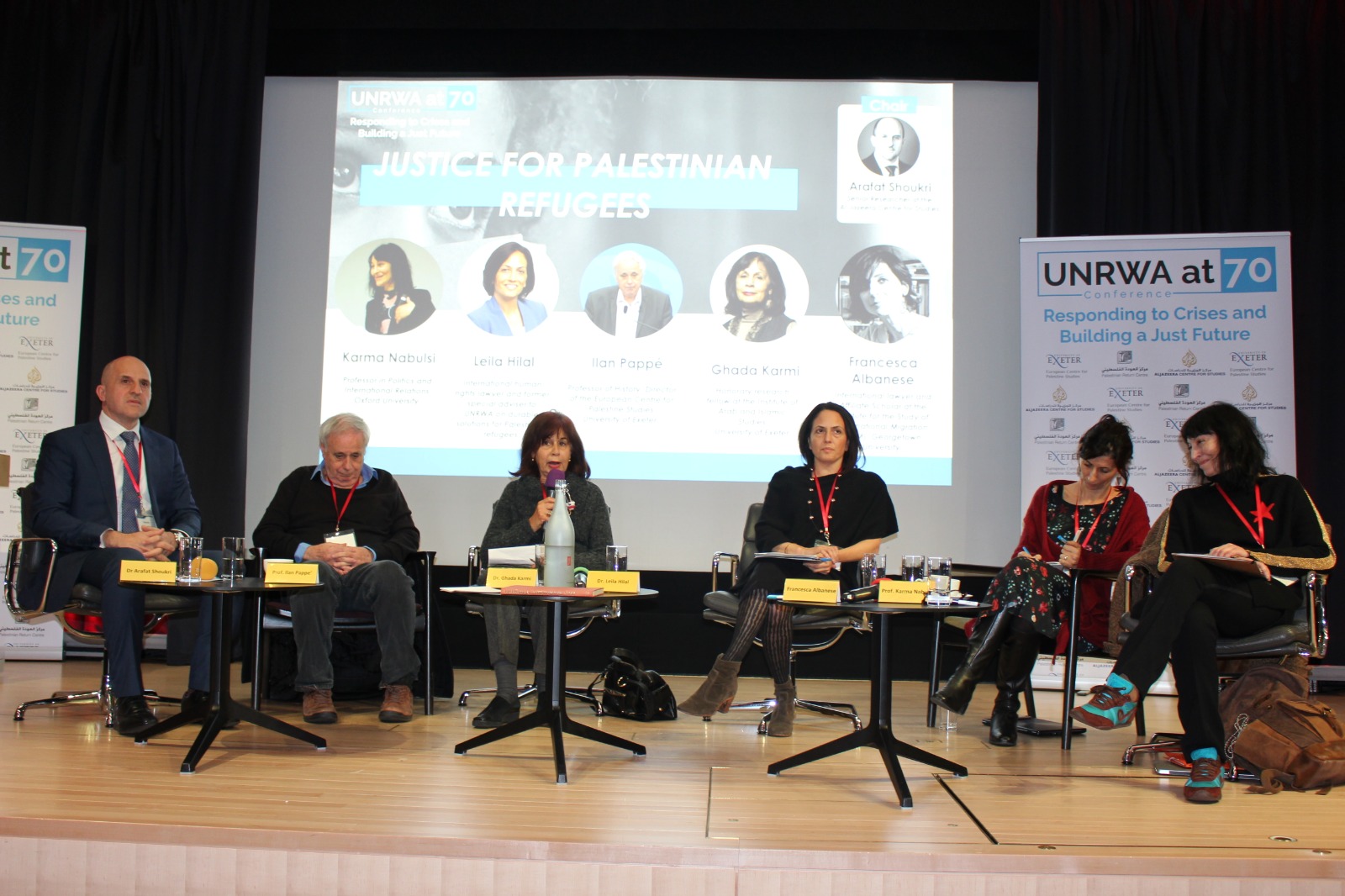
Opening the last session of the conference, entitled “Justice for Palestinian Refugees”, Ghada Karmi, honorary researcher fellow at the Institute of Arab and Islamic Studies at the University of Exeter, said the situation of Palestinian refugees is political and, therefore, it is impossible for UNRWA to remain outside of politics.
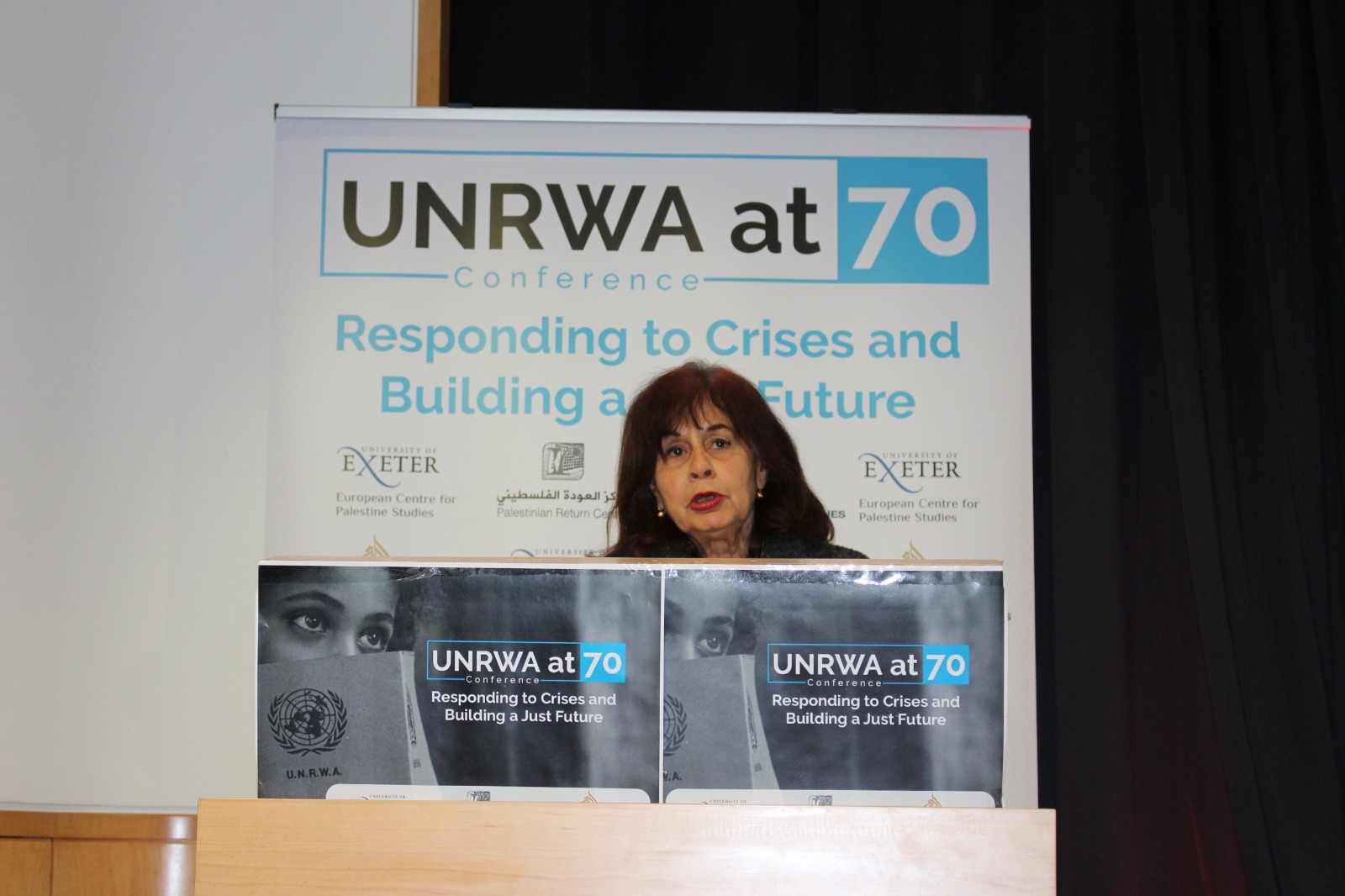
History professor and director of the European Center for Studies at the University of Exeter, Ilan Pappé, shed light on the recent policies of the Trump administration to depoliticize the Palestinian cause, saying such policies aim at shutting all doors before a political solution to the Palestinian issue, turning it into an economic one.
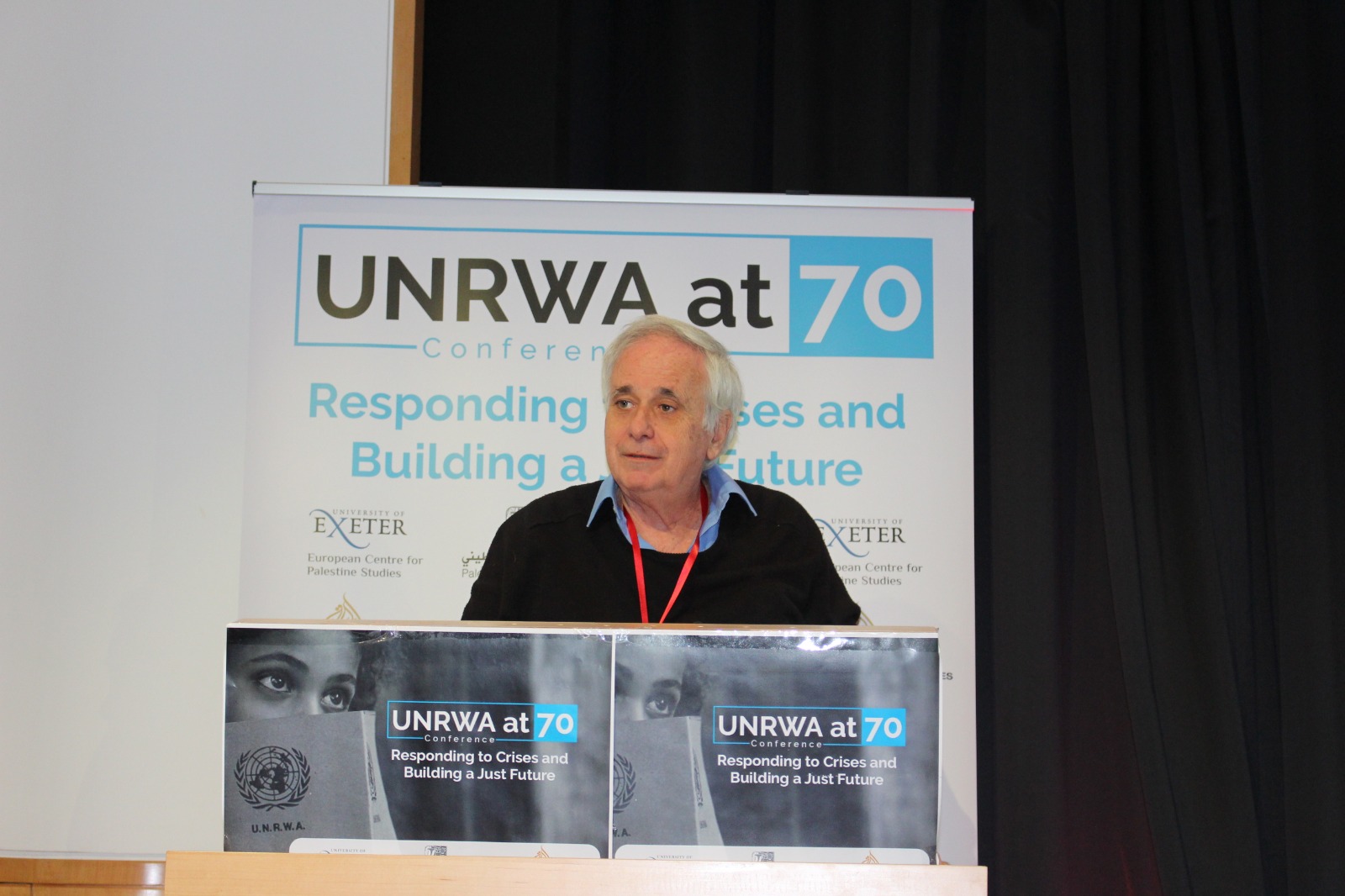
Senior fellow for the International Security Program and the former director of the Middle East Task Force at New America, Leila Hilal, highlighted the most efficient means to ensure justice for Palestinian refugees.
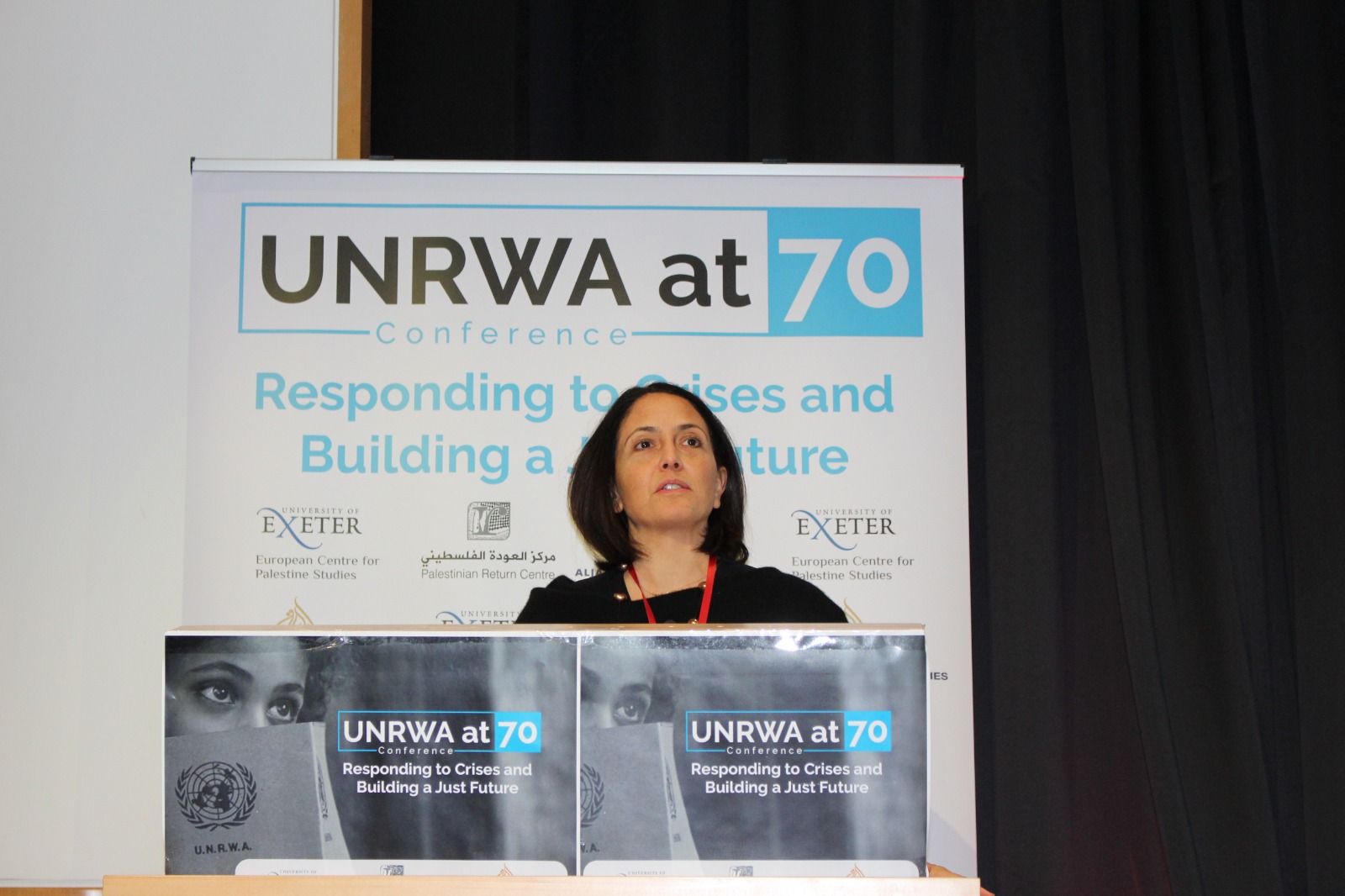
International lawyer and affiliate scholar at the Institute for the Study of International Migration at Georgetown University, Francesca Albanese, said continued attacks against UNRWA are aimed at obliterating the Question and the rights of Palestinian refugees altogether.
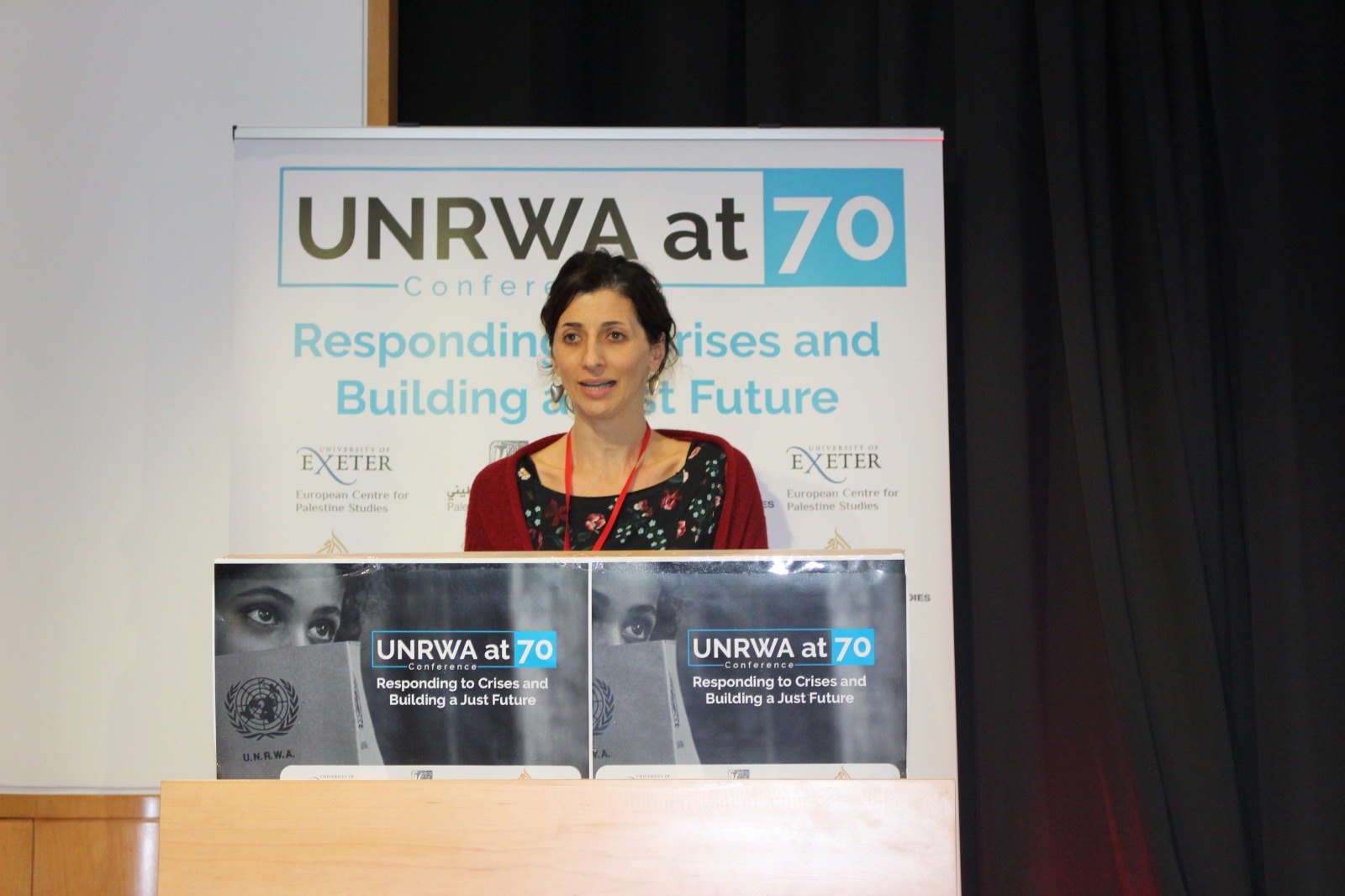
Albanese also said that in the case of Palestine, international law is in practice closer to power than to justice and has yet to serve to advance the interests of the Palestinians.
Professor in Politics and International Relations at Oxford University, Karma Nabulsi, gave a comprehensive description of UNRWA during the last session of the conference.
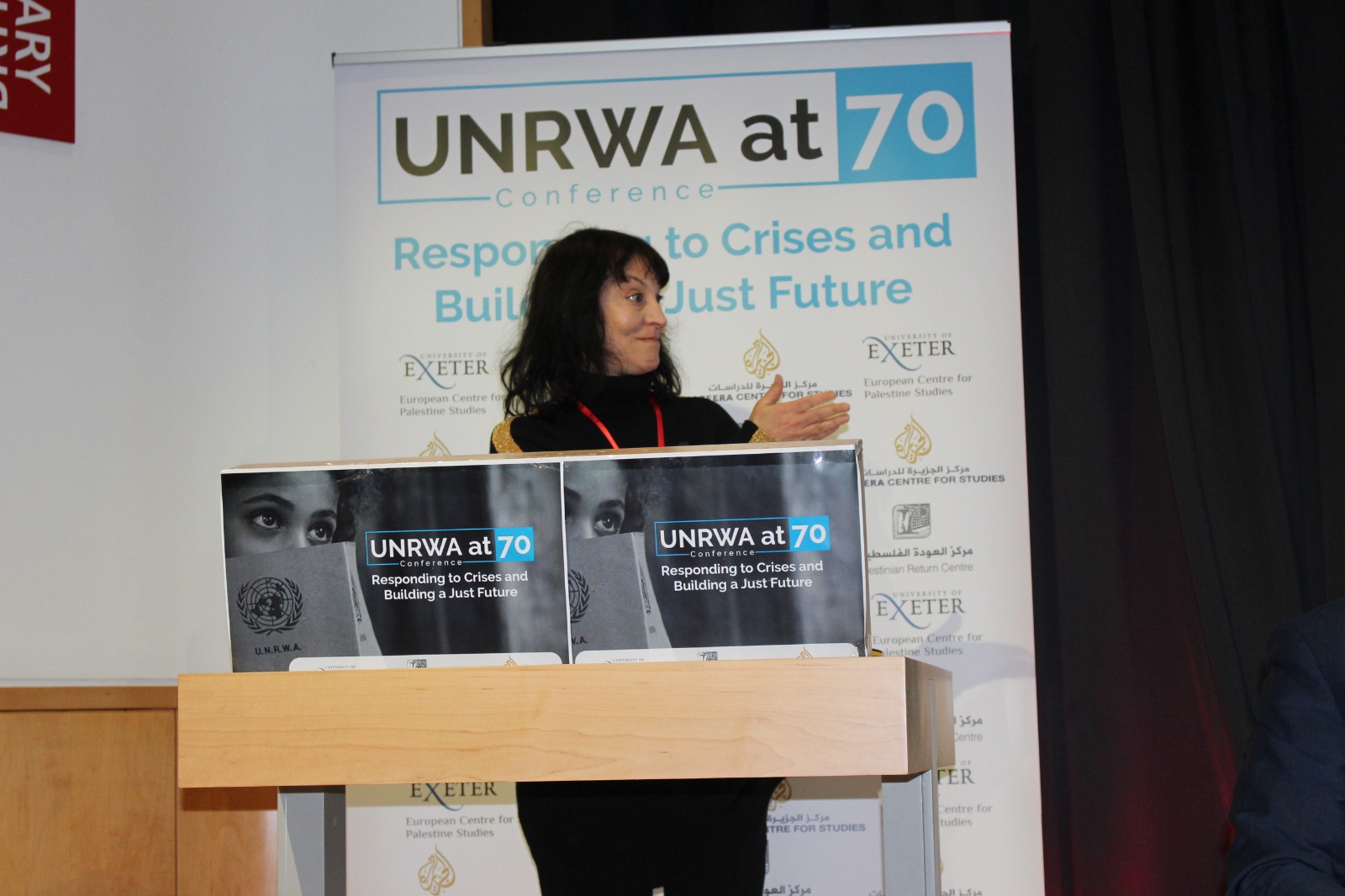
Nabulsi said UNRWA is not the agency of return. UNRWA is the memory of the international responsibility towards the Palestinians for their dispossession.
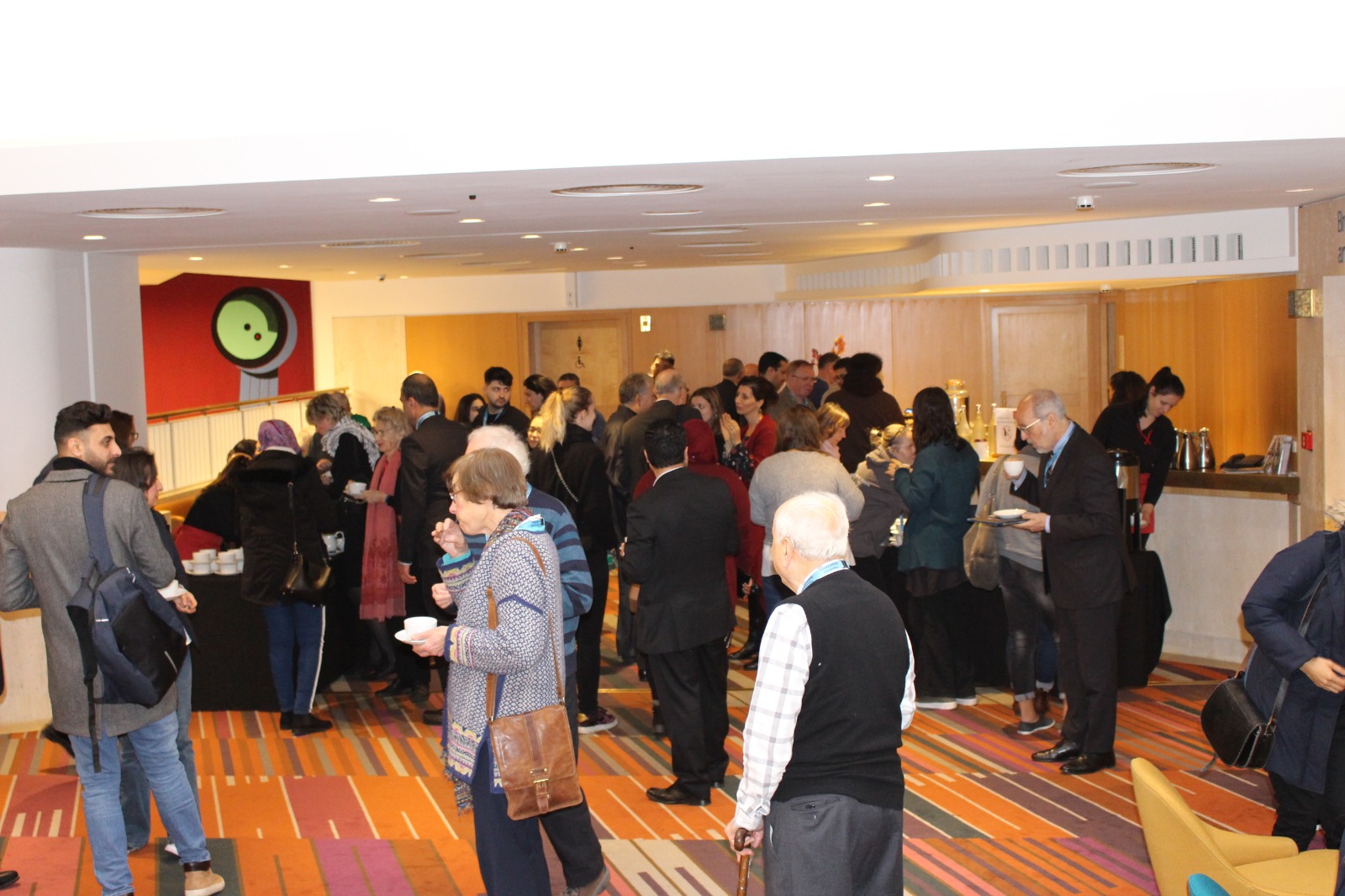
An audio-visual record of the conference is available via this link:
UNRWA is a United Nations agency established by the General Assembly in 1949 and mandated to provide assistance and protection to some 5.4 million Palestine refugees registered with UNRWA across its five fields of operation. Its mission is to help Palestine refugees in Jordan, Lebanon, Syria, West Bank, including East Jerusalem and the Gaza Strip achieve their full human development potential, pending a just and lasting solution to their plight. UNRWA services encompass education, health care, relief and social services, camp infrastructure and improvement, protection and microfinance.
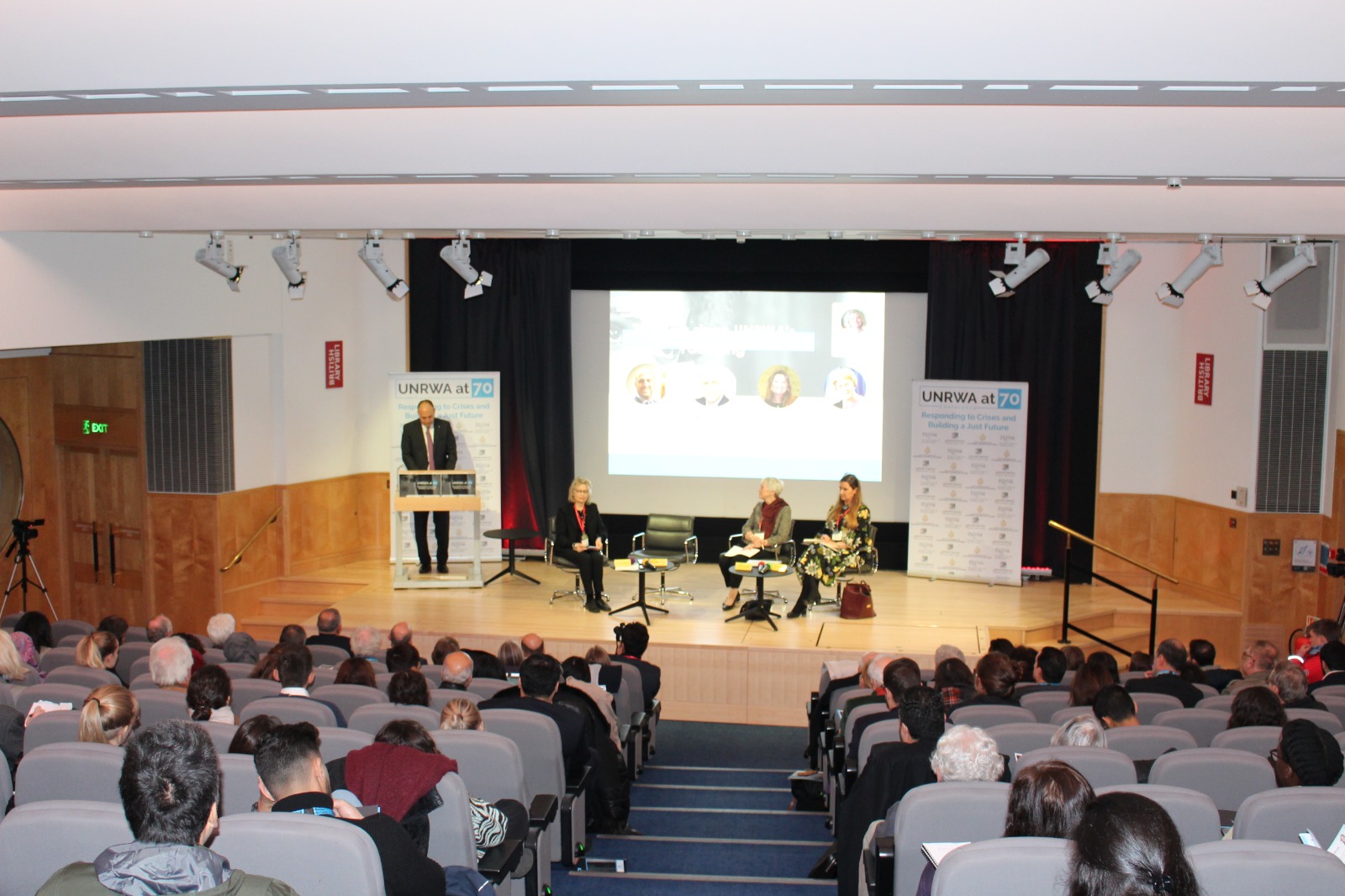
The Palestinian Return Centre (PRC) is an independent, non-partisan, organization committed to advocating for Palestinian refugees, in accordance with the historical, political and legal basis of the right of return.
Although the PRC is Palestinian in origin, it is not affiliated with any particular organization or party. It strongly adheres to the belief that the plight of the Palestinians is not just a national liberation movement but is, in essence, about the core values and ideals that are at the centre of any human civilization and international law.
